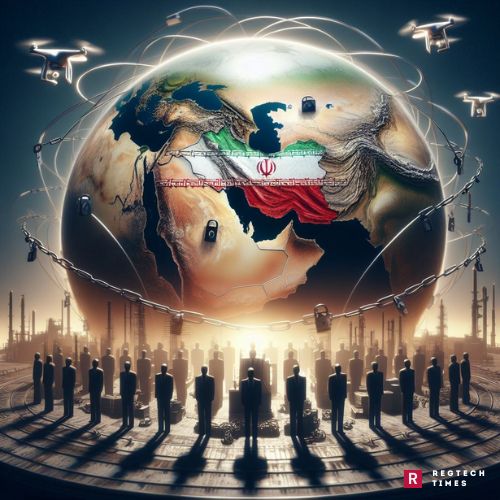In a decisive response to Iran’s recent unprecedented attack on Israel, the USA has escalated its economic sanctions against Iran, targeting key sectors and individuals associated with the country’s military and industrial capabilities. The new sanctions, announced by the U.S. Department of the Treasury and the Department of Commerce, aim to stifle Iran’s unmanned aerial vehicle (UAV) programs, its major steel producers, and its automotive industry, which have been identified as supporting Iran’s military activities.
The Treasury’s Office of Foreign Assets Control (OFAC) is leading the charge by imposing sanctions on 16 individuals and two entities directly involved in Iran’s UAV production and testing. These sanctions are specifically aimed at disabling the production capabilities of Iran’s Shahed variant UAVs, which were notably utilized in the attack on Israel on April 13, 2024. The individuals and entities targeted are linked to the Islamic Revolutionary Guard Corps-Qods Force (IRGC-QF) and its UAV production arm, Kimia Part Sivan Company (KIPAS), amongst other manufacturers involved in Iran’s UAV and UAV engine sectors.
The sanctions extend beyond the military sphere into Iran’s economic backbone, the steel industry. The USA has sanctioned five companies across multiple jurisdictions that either supply component materials for steel production to Iran’s Khuzestan Steel Company (KSC) or purchase finished steel products from KSC. KSC, recognized as one of Iran’s largest steel producers, is a significant revenue generator for the Iranian government, with its exports mainly consisting of billions of dollars worth of steel annually.
Moreover, the automotive sector is not spared, as the Treasury has also sanctioned the Iranian automaker Bahman Group along with three of its subsidiaries. These entities are accused of materially supporting the IRGC and other entities designated under USA counterterrorism authorities, including Iran’s Ministry of Defense and Armed Forces Logistics (MODAFL). These sanctions are part of a broader strategy to cut off financial and material support to Iran’s military operations.
In addition to the Treasury’s actions, the Department of Commerce has instituted new controls that significantly restrict Iran’s access to critical technologies, particularly basic commercial-grade microelectronics. These controls are designed to ensure that technologies essential for military applications, such as those used in UAVs, do not fall into Iranian hands. Importantly, these restrictions also apply to items manufactured outside the USA but produced using USA technology, reinforcing the global reach of USA sanctions.
The coordinated sanctions are a part of a broader international effort, with the United Kingdom also announcing similar measures targeting Iranian military organizations and their affiliates involved in the UAV and ballistic missile industries. This international alignment underscores the global concern over Iran’s aggressive actions and its implications for regional stability.
Secretary of the Treasury Janet L. Yellen emphasized the resolve of the U.S. government in her statement, declaring that the USA will continue to use its economic tools to “degrade and disrupt key aspects of Iran’s malign activities.” Over the past three years, the U.S. has targeted over 600 individuals and entities associated with Iran’s terrorist activities, human rights abuses, and financial support networks.
These sanctions are enacted under several executive orders that provide the legal basis for USA actions, including Executive Order 13382 related to counter-proliferation, Executive Order 13871 concerning sanctions on the metals sector, and Executive Order 13224, as amended, targeting terrorism.
Related articles:
- Palestinian Call for Sanctions Against Israeli Soccer in FIFA
- U.S. Explores New Strategies for Monitoring North Korean Sanctions
- European Union Imposes New Sanctions on Iran Following Drone and Missile Attack on Israel
The implications of these sanctions are profound. All property and interests in property of the designated individuals and entities that are within the United States or under the control of U.S. persons are blocked and must be reported to OFAC. Furthermore, the measures prohibit any transactions involving these entities by U.S. persons or within the U.S., thereby isolating these actors from the U.S. financial system.
In conclusion, the recent U.S. sanctions against Iran represent a significant escalation in the international efforts to counter Iran’s military capabilities and its support for regional conflicts. By targeting critical sectors and imposing stringent controls, the U.S. and its allies aim to curb Iran’s ability to fund and equip its military engagements, thereby promoting regional peace and stability.



